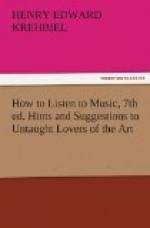“Very ready we are to say of a book, ’How good this is—that’s exactly what I think!’ But the right feeling is, ’How strange that is! I never thought of that before, and yet I see it is true; or if I do not now, I hope I shall, some day.’ But whether thus submissively or not, at least be sure that you go at the author to get at his meaning, not to find yours. Judge it afterward if you think yourself qualified to do so, but ascertain it first.”
[Sidenote: The critic generally outspoken.]
As a rule, however, the critic is not guilty of the wrong of speaking out the thought of others, but publishes what there is of his own mind, and this I laud in him as a virtue, which is praiseworthy in the degree that it springs from loftiness of aim, depth of knowledge, and sincerity and unselfishness of purpose.
[Sidenote: Musician and Public.]
[Sidenote: The office of ignorance.]
[Sidenote: Popularity of Wagner’s music not a sign of intelligent appreciation.]
Let us look a little into the views which our factors do and those which they ought to entertain of each other. The utterances of musicians have long ago made it plain that as between the critic and the public the greater measure of their respect and deference is given to the public. The critic is bound to recognize this as entirely natural; his right of protest does not accrue until he can show that the deference is ignoble and injurious to good art. It is to the public that the musician appeals for the substantial signs of what is called success. This appeal to the jury instead of the judge is as characteristic of the conscientious composer who is sincerely convinced that he was sent into the world to widen the boundaries




